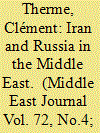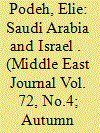| Srl | Item |
| 1 |
ID:
163605


|
|
|
|
|
| Summary/Abstract |
Saudi Arabia’s economic diversification to date has largely involved “production with rentier characteristics” — a mode of production that relies on oil-driven advantages such as energy- and capital-abundance and foreign labor. The kingdom’s previous attempts to invest in human capital development in order to create labor-intensive sectors for local citizens were hampered by institutional fragmentation in the education sector and the legacy of rentierism. While the current government is integrating the school system and training programs, capacity-building remains the major challenge in building a skilled Saudi workforce.
|
|
|
|
|
|
|
|
|
|
|
|
|
|
|
|
| 2 |
ID:
163603


|
|
|
|
|
| Summary/Abstract |
This article sheds light on the converging interests between Iran and Russia in the Middle East as well as persistent points of friction between the two countries. There is an internal debate in Iran about defining a new regional and foreign policy in the aftermath of the Arab Spring and during the administration of United States president Donald Trump. As there are no purely bilateral relationships in the international system, the Tehran-Moscow relationship is, to a certain extent, influenced by US foreign policy.
|
|
|
|
|
|
|
|
|
|
|
|
|
|
|
|
| 3 |
ID:
163606


|
|
|
|
|
| Summary/Abstract |
Since the mid-1990s, both the Israeli state and Israeli society have been developing and implementing several separate new policies regarding the country’s seas. These include the extraction of offshore hydrocarbons; expansion of the navy; massive desalination projects; and several legislative, planning, and zoning initiatives. Put together, these changes amount to a “turn to the sea” that profoundly affects Israel’s economy, foreign policy, and military. This article compares this shift to historical precedents, offering Israel as a template for a new, cumulative model that does not conform to the existing narratives of how polities have turned to the maritime domain.
|
|
|
|
|
|
|
|
|
|
|
|
|
|
|
|
| 4 |
ID:
163604


|
|
|
|
|
| Summary/Abstract |
Media reports have recently indicated that Israel and Saudi Arabia have been cooperating behind the scenes against their common enemies, Iran and jihadist groups. This article sets to explore the rationale behind and essence of this cooperation, while putting it in proper historical perspective. The article shows that Saudi policy toward Israel was consistently dictated by pragmatism rather than ideology, while Israel’s suspicions toward the kingdom disappeared only following the 2006 Lebanon War and the Arab Spring.
|
|
|
|
|
|
|
|
|
|
|
|
|
|
|
|
| 5 |
ID:
163607


|
|
|
|
|
| Summary/Abstract |
The most significant macro-historical trend of the late 20th century Arab world was the consolidation of undemocratic governance. One of the most visible manifestations of this phenomenon was the establishment of personality cults surrounding authoritarian rulers. This article analyzes the first such cult in the Arab world, that of Colonel Adib al-Shishakli, who was effectively dictator of Syria from 1949 to 1954. This article undermines the presumptions that Hafiz al-Asad’s cult of personality was unprecedented in Syrian history and modeled solely on previous cults in Communist dictatorships.
|
|
|
|
|
|
|
|
|
|
|
|
|
|
|
|